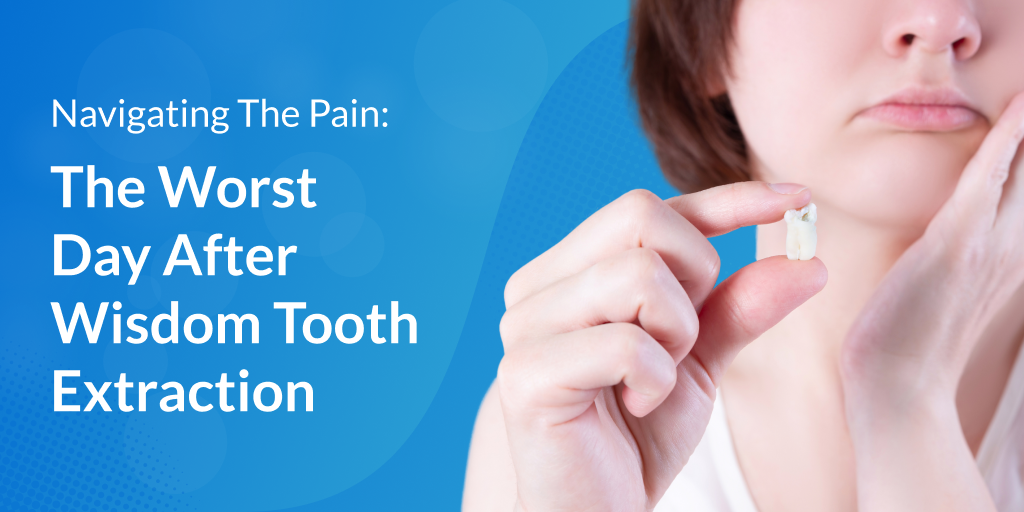Navigating Wisdom Tooth Woes: Understanding the Pain Timeline and Relief Strategies
Wisdom teeth, also known as third molars, are the last teeth to erupt, typically between the ages of 17 and 25. Unfortunately, these latecomers often lack enough space in the jaw to erupt properly, leading to various problems like impaction, crowding, and pain. Wisdom tooth extraction is a common dental procedure to address these issues. While the extraction itself is performed under anesthesia, the recovery period can be uncomfortable. This comprehensive guide explores the potential pain timeline after wisdom tooth extraction, delves into effective pain management strategies, and offers helpful tips for a smooth recovery.
The Rollercoaster of Pain: Understanding the Wisdom Tooth Extraction Timeline
The pain after wisdom tooth extraction typically follows a predictable pattern, with varying degrees of discomfort:
- First 24 Hours: This is often the most uncomfortable period. Following the anesthetic effects wearing off, localized throbbing pain and swelling around the extraction site are common.
Worst Pain Day: Statistically, the pain tends to peak around 24-72 hours after surgery. This discomfort can be significant, impacting sleep and daily activities.
- Days 3-7: The swelling and pain gradually subside. You might still experience some soreness, but it should become more manageable.
- Week 2 and Beyond: Healing progresses, and discomfort should significantly decrease. However, occasional sensitivity or tenderness might persist for a few weeks.
Remember: This timeline is a general guideline. Individual experiences can vary depending on the complexity of the extraction, the number of teeth removed, and your body’s healing response.
Conquering the Discomfort: Effective Pain Management Strategies
Here are some essential tips to effectively manage pain after wisdom tooth extraction:
- Medication: Your dentist will likely prescribe pain medication to help manage discomfort. Take it as directed, even if you don’t feel intense pain initially. Pain is easier to prevent than to control once it intensifies.
- Ice Therapy: Apply ice packs to the outside of your cheek, near the extraction site, for 15-20 minutes at a time, with breaks in between. This helps reduce inflammation and swelling, which can contribute to pain.
- Elevation: Keep your head elevated while sleeping or resting to minimize swelling and discomfort. Use extra pillows to achieve proper head positioning.
- Rest and Relaxation: Your body needs time to heal. Get plenty of rest and avoid strenuous activities that could hinder healing or cause further pain.
- Gentle Rinses: Starting 24 hours after surgery, gently rinse your mouth with warm salt water (dissolve half a teaspoon of salt in a glass of warm water) several times a day. This helps remove food particles and promotes healing.
- Soft Foods: Stick to a soft food diet for the first few days after surgery. This minimizes chewing and reduces pressure on the extraction site. Opt for foods like mashed potatoes, yogurt, applesauce, and well-cooked pasta.
Additional Tips:
- Avoid Smoking and Alcohol: These substances can hinder healing and increase the risk of infection.
- Maintain Oral Hygiene: Gently brush your teeth and tongue (avoiding the extraction site) to maintain good oral hygiene and prevent infection.
When to Seek Further Help
While some discomfort is expected after wisdom tooth extraction, it’s crucial to know when to seek further help from your dentist:
- Severe or Unrelenting Pain: If the pain is severe or doesn’t improve with medication after a few days, contact your dentist.
- Excessive Bleeding: While some minor bleeding is normal after extraction, excessive bleeding that doesn’t subside within a reasonable timeframe warrants a call to your dentist.
- Fever: A fever can indicate an infection. If you experience a fever along with pain or swelling, contact your dentist immediately.
- Numbness that Persists: Temporary numbness around the extraction site is normal, but if it persists for several days or weeks, consult your dentist.
Frequently Asked Questions (FAQ)
Q: How long does the pain last after wisdom tooth extraction?
A: The pain typically peaks 24-72 hours after surgery and gradually subsides over the following week. However, the timeline can vary depending on individual factors.
Q: What can I take for pain after wisdom tooth extraction besides prescribed medication?
A: Over-the-counter pain relievers like ibuprofen or acetaminophen might be helpful alongside your prescribed medication. However, always consult your dentist before taking any additional medications.
Q: Can I use ice packs directly on my gums after surgery?
A: No, applying ice packs directly to your gums can damage them. Always apply ice packs to the outside of your cheek, near the extraction site.

